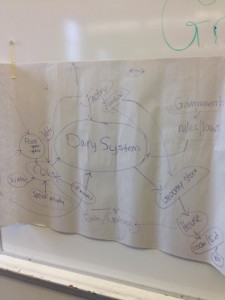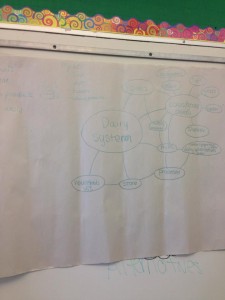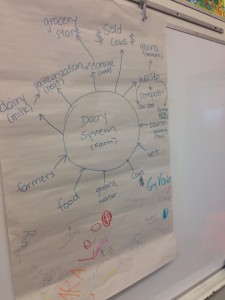Hello there! This Wednesday we finally got to meet the Grade 5 and 6 kids at David Livingstone Elementary School! Hosting our first nutrition workshop was a lot of fun and the kids were a really exciting and enthusiastic group to work with. Before going into our weekly objectives, here are some snapshots of the workshop 🙂
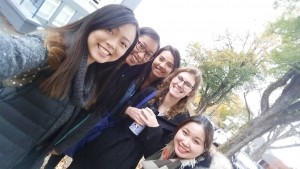
Because selfies are a must 😉 #selfiegamestrong #lfstakesfoodliteracy
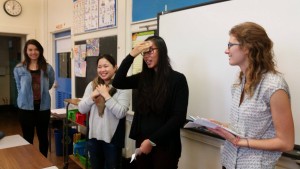
Hilary and Annie doing a demo on our introductory game- “What am I?”- where Hilary was supposed to be a banana and had to ask Yes/No questions about herself. The kids had a blast!
Weekly Objectives
- Implement workshop 1 successfully on Wednesday October 21, 2015.
- Reflect on workshop 1 after it is completed.
- Plan workshop 2 based on reflections and feedback.
Achievements
- The workshop ran smoothly. The children enjoyed the workshop very much and even asked interesting questions. The teacher was satisfied with our workshop and complimented on our great timing.
- After the workshop, we discussed about what we did well and what we could have improved. We all thought the kids were curious in the material however attention span was relatively short as the teacher mentioned before. Their knowledge on food varied among the class, where some had great instinct but others struggled, but were nevertheless willing to learn. We will use our observations to help develop our second workshop.
- Our preliminary plan for next workshop was to include food preservation methods relevant to the novel “Hatchet” they read and a hands-on yogurt making workshop. However we still need to inquire Will and Carrie about the yogurt machine, as we hope to include this in our next workshop.
Poultry Slam? Dan Barber’s Story about ethical Foie Gras production
What?
In the podcast, Dan Barber, chef of restaurant Blue Hill (located in New York) talked about an ethical way of obtaining Foie Gras. Foie Gras, being the controversial topic for animal welfare, was mostly criticized on the feeding method gavage. Here Dan said he visited Eduardo’s Farm where he didn’t domesticate the geese because he was trying to create an illusion of “wilderness” for the animals. Dan couldn’t believe it at first, as this is not how conventional farms raise their geese. The living area for the geese was not fenced or protected at all, which resulted in the loss of 20-30% of geese due to predators. Dan was very skeptical of the mechanism of this farming method and was prejudiced about Eduardo’s Farm. The wild geese came to stay – against instinct to fly south and mate with domesticated geese.
So what?
This relates to the class theme of flexibility and scope change and how we stumbled upon new situations and problems during our project development. When Dan is trying the new method at his organic farm, he fails because the predator problem is much more prevalent. They have aggressive wild animals such as coyotes, so the no-fence ideal is not quite feasible. Another problem is that in New York State, winters are more severe than the ones in Spain, therefore instead of starving the geese in the wild, they have to feed them in order to ensure health status of the livestock. He seeks help from Eduardo who helped him create a better wilderness setting . We can see that under conflict, he does not give up. He determines the problem and searches for a solution. He improves the farming style each year to achieve what he wants/ desires.
Now what?
One thing we learn from the podcast is to keep an open-minded perspective. Initially Dan doubted Eduardo’s farming style, although he does not realize that there’s really no right answer. There are many different ways of doing things and one must find a way that adheres to one’s goals and values. Here we know the conventional method may be effective, but it may also be unethical. If it does not identify with your values, perhaps you should find a way that will work better. In our workshop, we haven’t met our students before hand so it may be hard for us to develop a workshop accustomed to their understanding and accommodate them best. However, we can be open and creative and find out what can potentially work with the students.
Another key element is to be adaptive. Dan faces many problems when he introduces the “natural way” of his “failed gras” production, but he keeps changing and fine tuning his game plan. In our first workshop, one of our group members had an emergency family matter to deal with and unfortunately could not make it. We quickly changed our original plan and had another member cover for the other’s part. Adaptability is therefore critical when it comes to project planning. Lucky for us, the workshop still ran smoothly!
This 180 g jar of Foie Gras is worth 180,00 € (tax incl.)! That’s around CAD$26000!!
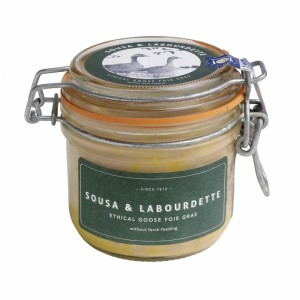
Picture Source: http://www.sousa-labourdette.com/
Eduardo and his geese
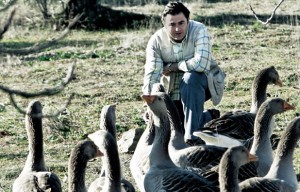
Picture Source: https://twocentcreatures.wordpress.com/tag/eduardo-sousa/
The last activity of our first workshop was to let students create a dairy system model (similar to what we did in LFS 250 :P). Of course, our models were quite basic since dairy and other food systems can be quite complex due to the many interconnecting relationships. However, we helped them as best we could and they ended up creating their very own dairy system models. Here are the final products! We were impressed!
Upcoming Objectives & Strategies to achieve them
- To develop our 2nd workshop- the yogurt making workshop!
– Planning details of the workshop
– Allocate tasks to team members
– Outline learning outcomes for students - Communicate our findings with Carrie and seek improvements.
– Share what we did during our first workshop, what went well and what could be changed.
– Discuss our observations and try to implement and adjust the 2nd workshop plan accordingly - Gather findings as a group.
– Compile collected findings in a neat format
Thank you for reading and we look forward to sharing more about the upcoming activities we have planned for our students and the experience we will have along the way. I think we are almost as excited about yogurt making as the students are!
Cheers,
Group 8

